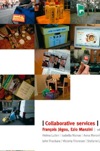Collaborative Services: social innovation and design for sustainability
A new book, edited by François Jégou and Ezio Manzini (with a chapter by John Thackara in it) attempts to answer some of these questions. Collaborative Services: Social Innovation and Design for Sustainability suggests a variety of scenarios: Car-sharing on demand, micro-leasing system for tools between neighbours, shared sewing studio, home restaurant, delivery service between users who exchange goods… The scenarios looks at how these kinds of daily life activities could be performed by structured services that rely on a greater collaboration of individuals amongst themselves.
Jeff Howard of Design for Service expands:
It’s a 200-page research report by François Jégou and Ezio Manzini that introduces a mosaic of 24 community initiatives.
Even though these organisations have different goals and actors, they present fundamental common traits: they are all built up by groups of people who collaborate in the co-creation of commonly recognized values. For this reason, we will call them collaborative organisations: production and services based on peer-to-peer, collaborative relationships and consequently on a high degree of mutual trust. Production and services where the values produced emerge out of relational qualities, i.e. out of real, dynamic personal relationships.
The collaborative service case studies are gathered from Milan, Paris, Eindhoven, Utrecht, Cologne, Glasgow and Helsinki and fall into six broad categories.
- Family-like Services organized within a household by combining common family routines with available household appliances.
- Community Housing based on particular housing infrastructure, which could allow for sharing domestic resources and mutual assistance.
- Extended Homes whereby a share of household activities are outsourced to collective infrastructures in the vicinity.
- Elective Communities in which members get organised and find synergies to help each other.
- Service Clubs are open workshops where a group of passionate amateurs share their skills and equipment.
- Direct Access Networks whereby groups of citizens arrange to buy directly from producers.
The second half of the publication includes 14 essays by various authors including a reflection on Dott2007 by John Thackara.
Note also the older publication Creative communities | People inventing sustainable ways of living.
(via Doors of Perception)





[…] Putting people first » Collaborative Services: social innovation … […]
[…] Putting people first » Collaborative Services: social innovation and design for sustainability […]